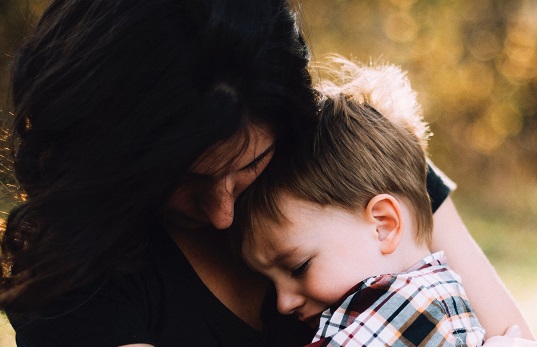Car accidents, medical emergencies, and exposure to violence can all leave a lasting impact on children. These traumatic events can scar a child, making it vital to their development for parents to help them through this time. With proper parenting, most can cope and fully recover from these incidents. Here’s how you can help children cope with traumatic events.
Identifying Trauma
There are a number of “red flag behaviors” for each age group that can help parents identify when a child has experienced trauma. Those under five may return to sucking their thumbs, bedwetting, or develop an irrational fear of the dark. Separation anxiety and excessive clinging are also signs at this age.
Children ages six through eleven often show more disruptive behaviors or withdraw. They may have difficulty paying attention, sleeping, or perform poorly in school. Some develop head or stomachaches, while others display highly unusual behavior.
From twelve to seventeen, children retain their difficulty sleeping. Truancy and delinquency are more common, as are risk-taking behaviors. They may have difficulty making friends, depression, and anxiety. In extreme cases, this age group may also develop suicidal thoughts.
Learn to Listen
The first step to helping children with trauma is simply to listen. Therapists and divorce attorneys agree that simply hearing what a child has to say and answering their questions with age-appropriate responses is highly beneficial.
Talk About Trauma in Doses
While it’s vital that you talk about the trauma the child has experienced to help them process it, there’s only so much a child can take. You need to pay attention for when they need a break from this intense discussion, giving them space and letting them return to the conversation when they are ready.
Don’t Underestimate Them
When children have questions about their trauma, don’t assume they are unaware of what took place or aspects that surround it. Children are smarter than you might think. So, answer their questions truthfully. It’s also essential that you keep your answers age appropriate, no mater what they surprise you with.
Coping with Anger and Confusion
Anger and confusion are common with trauma. Since even adults often need help expressing these emotions in healthy ways, it’s vital that you teach your child to do so. Psychologists, doctors, and accident attorneys have a variety of ways to help children of varying ages.
Younger children usually need to draw pictures of what happened to them instead of vocalizing it. Toys are also highly effective. This allows them to work through the event and better understand what happened with adult explanation.
Older children do best with action figures or dolls that make it easier to depict the roles of those involved. These toys can show danger, rescue, and identify good and bad players. As children enter school age, they may combine verbal recounts with toys.
Teenagers need small groups to open up, finding a way to bond with those closer in age and experience to themselves. For some, helping younger children that have also experienced trauma is a highly beneficial outlet. The more social activities teens are involved in, the better.

